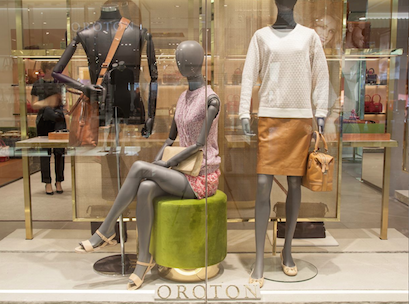 Accessories retailer Oroton is undergoing a business-wide strategic review with an eye to diversifying into new product categories as part of its turnaround plan.
Accessories retailer Oroton is undergoing a business-wide strategic review with an eye to diversifying into new product categories as part of its turnaround plan.
Oroton chief executive Ross Lane told IRW that the brand was looking to expand into apparel under the creative direction of Sophie Holt, who has joined the company after 13 years at Country Road. “We’re exploring other product categories, and you don’t have to be overly smart to realise with Sophie’s background in apparel that we should look at what an apparel strategy would look like,” Lane said.
Holt is widely credited with guiding Country Road’s resurgence. Her skills are already evident in Oroton’s latest campaigns and products – she worked for the brand as a consultant before joining the team full time – and she is expected to help modernise the offering moving forward.
“We’re already seeing [a change],” Lane said. “Her sense of style, her colour palette, her attention to detail. I’ve had the opportunity to work with Sophie… It’s all looking very good. World class.”
Lane said the team was currently exploring which materials, silhouettes, price points, distribution strategies and colours the range should entail.
“We haven’t got a launch date, [but] you probably want to launch something in the spring or summer season. At the moment it’s very much a due diligence process we’re undertaking,” he said.
Diversifying to grow
According to IBISWorld senior industry analyst Liam Harrison, retailers often expand into new product categories as a way to capture more of their existing customers’ spend and to attract new customers.
“For example, Aldi’s special buys have a broad range of limited time product offerings not often found in standard grocery stores,” he said, adding that the strategy had worked very well “as a point of differentiation from competitors such as Coles and Woolworths”. But Harrison said that multiple product offerings should remain complementary to the original “pitch” of the business.
“Some retailers attempt to ‘brand stretch’ by releasing new, unrelated products or services and leveraging their reputation to sell the new products. This can be a risky strategy, as poor performance of the new product can affect the reputation of the whole brand,” Harrison said.
“Spreading across multiple categories can also lead to issues such as ‘choice overload’, where consumers can feel that they have too many options, reducing the chance that they can make a firm decision and potentially putting off the purchase entirely.”
Vision at the top
The move reveals a sense of optimism after a rollercoaster year. OrotonGroup entered into voluntary administration in late 2017 after suffering heavy losses from the closure of the US-brand Gap stores it operated under licence, as well as falling sales for the Oroton brand.
“It was a pretty traumatic year during calendar 2017 and the early part of 2018,” Lane said. “It’s not something you prepare for. It’s emotional. We worked tirelessly, the management team and the board, to have a different option – a solvent option – but in the end we just couldn’t find one.”
Will Vicars, Oroton’s second-largest shareholder with 18 per cent of the company and a major creditor, purchased the company in March this year. He quickly initiated a strategic review of the business, including using qualitative and quantitative market research to better understand Oroton’s existing customers, potential new markets and store locations, and its online presence.
Oroton is also exploring how to best use technology to create a more robust omnichannel offering.
“Retailers are obviously having a relatively tough time. We’re in a very fortunate and exciting position because of our new capital structure, the availability we have to funds, the long-term vision the new owner brings and his willingness to invest in ideas that make sense, and put that together with a competent team, and a heritage and market awareness,” Lane said.





